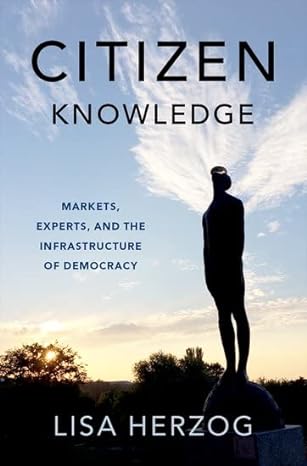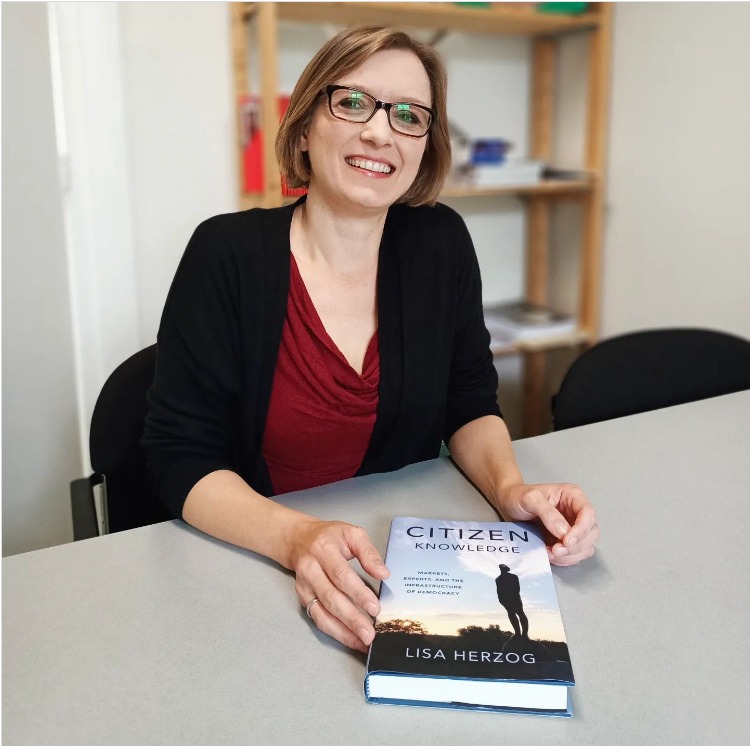'Free speech doesn't always lead to the truth.' | prof. Lisa Herzog on her book ‘Citizen knowledge.'
Interview by: Marco in 't Veldt

Many democratic societies struggle with issues around knowledge: fake news spreads online and offline, and there is distrust of experts, but also fear of technocratic tendencies. ‘Citizen Knowledge’ by professor Lisa Herzog discusses how knowledge, understood in a broad sense, should be dealt with in societies that combine a democratic political system with a capitalist economic system.
Defenders of democracy are sometimes criticized as hopelessly naive human beings. ‘The best argument against Democracy is a five-minute conversation with the average voter,’ Winston Churchill is claimed to have said.
Professor Lisa Herzog holds a less pessimistic view: ‘As political philosophers, we have long focused on the individual, when it comes to dealing with knowledge. We have neglected the collective and the shared infrastructures we can draw on.’


|
Prof Lisa Herzog works at the intersection of political philosophy and economic thought at the Faculty of Philosophy of the University of Groningen since 2019. Originally from Germany, she studied economics, philosophy and political theory in Munich and Oxford, and worked at the universities of St. Gallen, Frankfurt, Stanford and TU Munich. Since 2019 Lisa Herzog has been Professor of Political Philosophy at the Faculty of Philosophy and at the Center for Philosophy, Politics, and Economics at the University of Groningen. As dean of her faculty, she is part of the Advisory Board of the Rudolf Agricola School for Sustainable Development, of which she is also a Fellow. |
When did you start on ‘Citizen Knowledge’?
I started working on this book in 2017-18 when I held a fellowship at the Wissenschaftskolleg zu Berlin. Democracy has always had my interest. Much of the research I conducted for this book will also be relevant to my upcoming work, which delves into the relationship between work and democracy. It revolves around a similar question: how can the economy be better aligned with democracy?
What sparked your interest in this topic?
There are two types of philosophers. The first type addresses problems internal to the philosophical debate, while the second type tackles societal questions. I've always belonged to the second type. When I started my economics studies, it was during a period when there was a strong belief that the free market was the answer to everything, the best solution for dealing with all issues of knowledge. However, we've observed that the market has its flaws and deprives some people of everything, including access to information and knowledge.

Is democracy in danger?
Well, my book serves as both a response to developments in scientific research and a reflection of societal developments. We've witnessed two pivotal moments: Brexit and the election of Trump. These events ignited substantial discussions about the new technologies that played a significant role in these occurrences. Both were closely linked to the spread of fake news through social media platforms such as Facebook and Twitter.
In our era, there's this peculiar paradox: we use a very old technique - the red pencil - to vote, because new technologies are not found reliable, but many voters are informed through the newest technologies.
Yes, but remember that even Plato critically discussed of the new media of his time, the written word. He believed that people should engage in oral discussions rather than writing. Writing, in his view, was detrimental to memory and the art of discussion. I don't advocate a return to the past. A central question in my book is: ‘How can we adapt modern technologies in ways that strengthen, rather than undermine, democracy?’ The epistemic dimension is crucial—citizens must have a reasonable chance to access the knowledge that is essential for decision-making, and there must be appropriate networks of epistemic institutions and practices to assist individuals in this endeavor.
So, what can be done?
I use the expression 'marketplace of ideas' to describe the current discourse on freedom of speech. The market paradigm, ‘the market is always right,’ has spilled over into other areas, including the realm of ideas: ‘the best argument will win.’ However, this perspective fails to address the complexities of democratic discussions, and also the technical media that facilitate them.
First and foremost, we must dispel the misconception that allowing everyone to say whatever they want will inevitably lead us to the truth. This is a false notion; we need rules. Consider, for example, the role of courts of justice. They are responsible for ascertaining the truth on complex matters. To do so, they operate under strict regulations, determining who says what and when, and what kind of evidence is admissible.
This brings me to my second important point—an observation and recommendation: we need a form of epistemic infrastructure that ensures that citizens have access to reliable knowledge and enables citizens to contribute to political discussions and decisions. For example, how can we prevent certain types of speech that claim to be objective but are, in fact, driven by commercial interests? This requires raising awareness and implementing rules. The EU, for instance, is currently contemplating regulations for social media to combat fake news. Such regulations necessitate EU involvement because no single country can effectively address this issue alone.

Some people view rules, particularly those imposed by the EU, as impediments to free speech.
Well, I disagree. Take Elon Musk, the billionaire who now owns X, formerly known as Twitter. Musk professes to be a strong advocate of free speech, but the current state of free speech on Twitter resembles the law of the strongest. It's no wonder he supports it, as he possesses considerable power and privileges. However, the law of the strongest leads to an undemocratic concentration of power and is in direct contradiction to the equal moral standing of all citizens.
What was your methodology in writing this book?
I conducted extensive reading, both in philosophy and in relevant fields of social scientific research. I aimed for a synthesis, integrating various perspectives. I approached the work from an interdisciplinary angle, which can make one quite vulnerable. The danger lies in trespassing into the scientific territories of others, especially in areas where one may lack expertise. This is why I constantly consult with others to ensure I am on the right track, using the most up-to-date literature. Ultimately, it's a risk that one must take, and I consider it one of the primary responsibilities of philosophy to integrate insights from different fields to provide a coherent overall picture.
Would it be an option to write as an interdisciplinary team?
I've frequently collaborated with scientists from other fields throughout my career, and that's also the case now. While I wrote this book on my own, it embodies the contributions of numerous individuals and the outcomes of many discussions.
Team writing is becoming more common in philosophy. Colleagues often divide topics or engage in dialogue. Technology makes this collaboration easier, allowing multiple individuals to work on a document online. I've had positive experiences with such collaboration. But it's crucial to first get to know each other well and establish trust in interdisciplinary work. The personal ‘chemistry’ between the team members matters a lot. It is essential, but you can't plan it. That makes assembling a team challenging.

Can the Rudolf Agricola School play a role in it?
Yes, of course. It’s most important task -as I see it – is to create spaces and opportunities for encounters. In the right circumstances, magic can happen. It’s like gardening. You can plant and pull the weeds, but you can't pull the harvest out of the ground. You'll have to wait for something to grow and flourish.
Your book is not only interdisciplinary but also highly political. One of your recommendations is to move towards a more egalitarian society. Isn't that a very political statement?
As a researcher, I continually question my position as a researcher. The significant distinction between a researcher and a politician is that I present all the arguments both for and against. Ultimately, as a scientist, I present arguments in the form of a conditional, ‘If you want a stronger democracy, it would be wise, for the arguments provided, to make society more egalitarian.’
What are your other recommendations for strengthening democracy?
I propose allocating more resources to what I refer to as the epistemic infrastructure of society. Investments should be made in areas like education and media, which are indispensable for a robust democracy.
Solutions will differ from one country to another, and nations can learn from one another. In some countries, local newspapers have nearly vanished, leaving citizens uninformed about political events. In Sweden, for example, the government supports local newspapers financially. This approach requires careful consideration. The watchdog role of the press must not be compromised, and proper arrangements must be in place. However, Sweden has shown that it can be accomplished. Much depends on the implementation.
If the Dutch government has demonstrated anything in recent decades, it's that it struggles with implementation.
That's an interesting topic I'd like to explore more in the future. But first, I'll delve into the relationship between the organization of the labor market and democracy. Together with some Ph.D. students, I will conduct interviews in workplace settings to understand how people experience their work and its relation to their status as citizens. I believe that such qualitative research is invaluable for understanding the complexity of our social world from different perspectives. This is why I collaborate a lot with sociologists doing qualitative work. My hope is that this helps keeping my philosophical thinking grounded in the social world we live in.

More news
-
15 September 2025
Successful visit to the UG by Rector of Institut Teknologi Bandung

